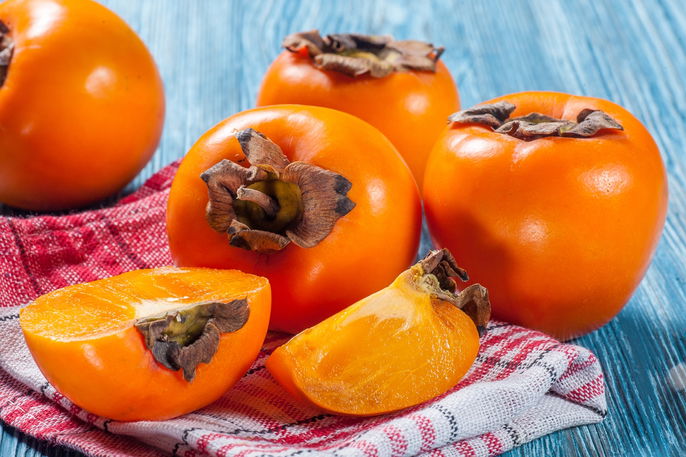The persimmon is a fruit rich in carotenes, tannins, and vitamin C, nutrients with antioxidant properties that protect the skin against damage caused by ultraviolet (UV) rays and help prevent skin cancer and premature aging.
Persimmons also contain good quantities of fiber that increases satiety (feeling of fullness) during the day and can help support weight loss.
Persimmons are classified as astringent or non-astringent, and vary in terms of texture (firm or soft), color (yellow to red), level of sweetness, and the amount of tannins they contain. Persimmons can be eaten on their own or added to recipes for juices, salads, and preserves.

Health benefits
The main health benefits of persimmons include:
1. Relieving constipation
Persimmons are rich in soluble fiber, a type of fiber that absorbs water into the gut to make the stool softer and easier to pass, thus helping to prevent and relieve constipation. See natural laxatives.
2. Protecting against premature aging
Persimmons can help prevent premature aging because they are rich in vitamin C, an essential nutrient for the production of collagen, which is the protein responsible for maintaining firmness and elasticity of the skin.
The persimmon also contains tannins and carotenoids, which are bioactive compounds with antioxidant properties that help to prevent skin cancer by protecting the skin against damage caused by ultraviolet (UV) rays and free radicals.
3. Supporting weight loss
The fiber found in persimmons dissolves in water to form a gel-like substance in the stomach, slowing down digestion and helping to control hunger. This can help support weight loss by lowering the total number of calories ingested during the day.
Check out best fruits for weight loss.
4. Strengthening the immune system
The persimmon is rich in vitamin C, carotenoids, and tannins, which are antioxidants that protect and strengthen the immune system, helping to fight viruses, bacteria, and fungi and shortening the duration of colds, flu, and allergies.
5. Preventing diabetes
Persimmons are a high-fiber fruit that decreases absorption of sugar in the gut, helping balance blood sugar levels and prevent insulin resistance and diabetes.
6. Maintaining eye health
Persimmons are rich in carotenoids, like lutein and beta carotene, that protect the eyes from UV rays from the sun as well as blue light from computer and phone screens, helping maintain eye health and preventing the formation of cataracts.
7. Lowering "bad" cholesterol
The persimmon is rich in fiber that reduces the absorption of fat in the gut, helping lower levels of LDL ("bad") cholesterol and triglycerides in the blood and decreasing the risk of cardiovascular diseases like heart attack, stroke, and atherosclerosis.
8. Balancing the gut flora
Persimmons are high in fiber that serves as a source of food for the good bacteria in the gut, helping to maintain a healthy gut flora and preventing conditions like diarrhea and intestinal cancer.
9. Helping treat anemia
The persimmon is rich in vitamin C, a vitamin that helps improve iron absorption from foods. Iron is fundamental to the formation of hemoglobin in the blood, which is responsible for transporting oxygen throughout the body and is diminished in people with anemia.
See vitamin C foods.
10. Preventing high blood pressure
Persimmons contain carotenoids, vitamin C, and tannins, which possess antioxidant and anti-inflammatory properties that can help improve circulation and prevent high blood pressure.
Are persimmons fattening?
Eating persimmons can help support weight loss due to their high quantities of fiber that helps slow down digestion, prolong satiety (feeling of fullness), and decrease hunger throughout the day.
However, high calorie recipes using persimmon can lead to weight gain. These include desserts that are high in sugar and fat, such as mousse, pudding, preserves, and ice cream.
Nutrition facts
The following table provides nutritional information based on a 100 g serving (1 medium persimmon):
In order to get all the benefits from eating persimmons, it is important to include them as one part of a healthy, well-balanced diet combined with regular physical exercise.
How to eat
While there is no specific recommendation for how much persimmon to eat in a day, the minimum daily amount of fruit to eat is 2 to 3 portions per day, which is between 160 and 240 g of persimmons.
Persimmons can be consumed by themselves or added to recipes for salads, juices, ice cream, cakes, and preserves.
Healthy recipes
Some healthy and delicious ways to use persimmons include recipes for juices and salads:
1. Persimmon juice with lemongrass
Ingredients:
- 2 cups persimmon (with the skin), washed and chopped;
- 2 Tbsp lemongrass, washed and chopped;
- 500 mL (16 oz) filtered water;
- Ice cubes as desired.
Directions:
Place all the ingredients in a blender and blend for 2 minutes. Transfer to a glass and serve.
2. Arugula persimmon salad
Ingredients:
- ½ bunch of arugula;
- ½ head Bibb lettuce (also known as Boston or butter lettuce);
- 1 ripe persimmon;
- 2 Tbsp chopped walnuts;
- 2 Tbsp olive oil;
- Salt and pepper to taste.
Directions:
Wash the lettuce, arugula, and persimmon. Tear the lettuce and arugula and arrange on a platter. Slice the persimmon and add to the greens. Add the walnuts, olive oil, salt, and pepper and toss well. Put in the refrigerator for a few minutes and serve cold.






























